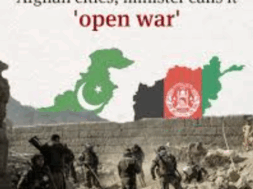
The $9 bn lifeline: Emboldened, bankrupt Pak may now spike terror attacks in India
Virendra Pandit
New Delhi: With donors assuring a USD 9 billion lifeline to rescue the sinking economy of a failed Pakistan, an emboldened Islamabad may multiply terrorist attacks on India to divert its hungry people’s attention from the internal Taliban challenge to revanchist agenda in Jammu and Kashmir in the next few weeks.
Bankrupt Pakistan, a country deeply divided within, is already facing border challenges not only from Afghanistan’s ruling Taliban but also from homegrown Tehreek-e-Taliban Pakistan (TTP), and the Balochistan terrorists, in the restive western provinces.
And, to divert its people’s attention from domestic crises, Pakistan-sponsored terrorists have already multiplied terror attacks, as Islamabad raked up the Jammu and Kashmir issue ahead of India organizing the G-20 events across the country, including the border state.
The media reported on Monday that Pakistan said it will make sure that these funds go where they are needed. But past experience shows Pakistan has done exactly the opposite when it got relief funds from overseas and diverted these into the all-powerful armed forces and lined the corrupt politicians’ pockets.
This week, Pakistan Prime Minister Shehbaz Sharif participated in a Geneva summit on climate resilience, seeking funds to help the victims of devastating floods last year. Dozens of countries and international institutions on Monday pledged over USD 9 billion to help Islamabad recover and rebuild from the devastating summer floods of 2022 that United Nations Secretary-General António Guterres called “a climate disaster of monumental scale.”
The Pakistan floods killed over 1,700 people, destroyed two million homes, and covered nearly one-third of the country at one point, causing damage worth more than USD 30 billion. Large swaths of the country remained underwater for months with millions living near contaminated or stagnant waters, the UN said.
Wrapping up a day-long conference at the UN offices in Geneva, Pakistani Deputy Foreign Minister Hina Rabbani Khar said the final tally came in above a target for the international community to meet half of an estimated USD 16.3 billion needed to respond to the flooding. The rest is expected to come from the Pakistani government itself.
The media reported that although the UN pledging conferences often draw promises of big sums from governments, international organizations, and other donors, those don’t always get fulfilled entirely.
Earlier, Pakistani Information Minister Marriyum Aurangzeb said the top donors included the Islamic Development Bank (USD 4.2 billion), the World Bank (USD) 2 billion, and the Asian Development Bank (USD 1.5 billion). She said the European Union had pledged USD 93 million, Germany USD 88 million, China USD 100 million, and Japan USD 77 million. Besides, the US announced an additional USD 100 million and Saudi Arabia USD 1 billion.
Prime Minister Sharif and the UN chief attended the conference in person while French President Emmanuel Macron and Turkish President Recep Tayyip Erdoğan took part virtually.
Guterres said that people in South Asia are 15 times more likely to die from climate impacts than elsewhere, and his “heart broke” when he saw the devastation left behind by Pakistan’s floods.
Thousands of Pakistanis are still living in open areas in makeshift homes and tents near the stagnant water in southern Sindh and in some areas in southwestern Baluchistan, the two worst-flood-hit provinces in Pakistan.
Julien Harneis, the UN’s Resident Coordinator in Pakistan, said an estimated 5 million people were living near the stagnant waters, making it difficult for residents to have a normal life. He predicted little change in the situation until March.
According to UNICEF, only 37 percent of a USD 173.5 million target for supporting flood-affected Pakistani women and children has been met.
Prime Minister Sharif likened the flooding to “a tsunami from the sky.” He said the flooding immediately affected 33 million people and destroyed more than 2 million homes. The ferocity of the flowing water damaged over 8,000 km of roads, and over 3,100 km of railway track, besides damaging crops on a vast scale and rendering thousands of acres of submerged land waste for the next crops.
The world body says funding raised so far for Pakistan’s flood victims will run out this month, and an emergency appeal launched in October has garnered only about a third of the USD 816 million sought for food, medicines, and other supplies for Pakistanis.
Pakistan plays a negligible role in global warming and emits less than 1 percent of heat-trapping carbon dioxide, but like other developing countries, it has been vulnerable to climate-induced devastation, experts say. The country has seen extreme heat, glacial melt, and rising sea levels in recent years.
Climate scientists found that the floods in Pakistan were worsened by global heating although economic, societal, and construction-oriented factors also played a role.














